Shows
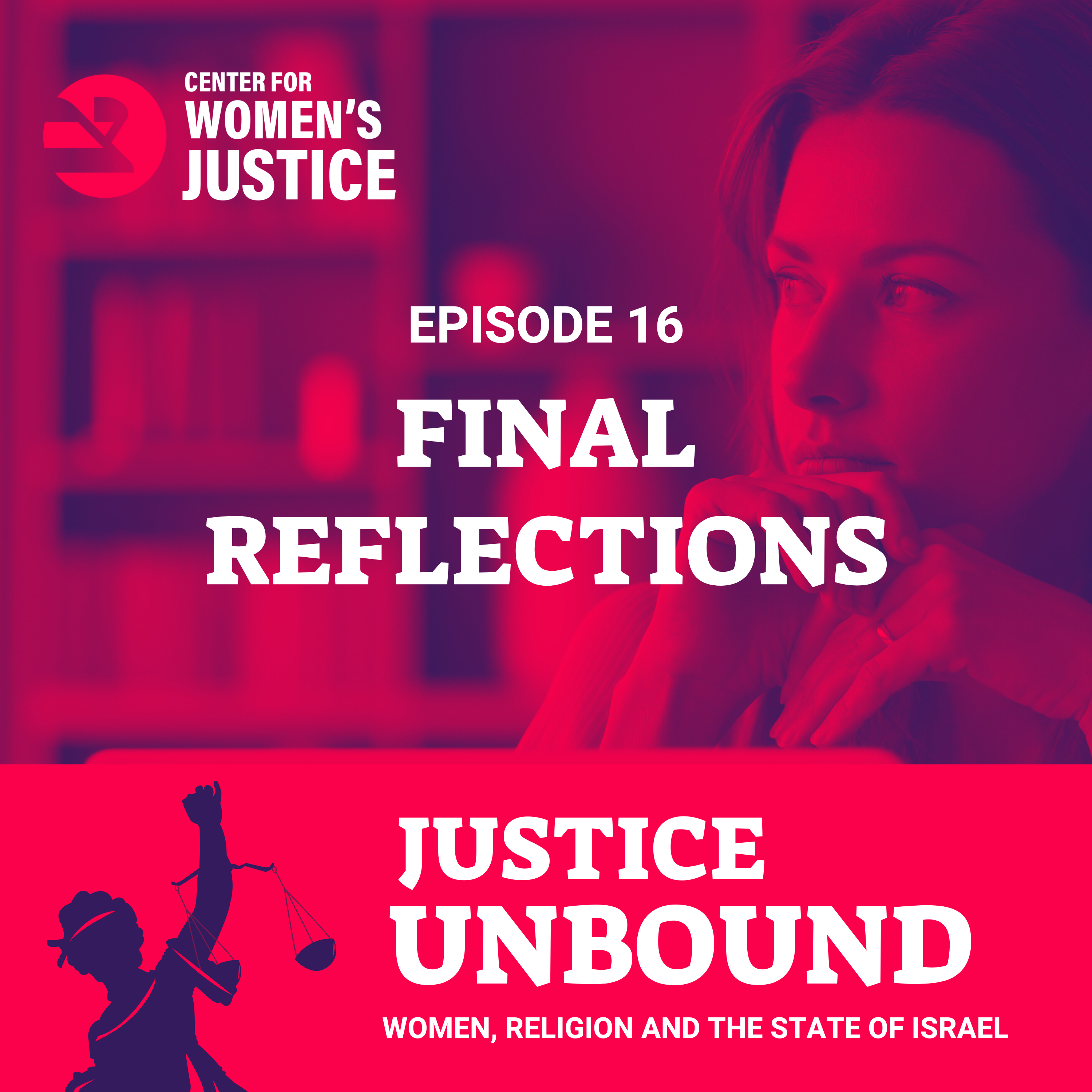 Justice Unbound: Women, Religion and the State of Israel(16) Final ReflectionsAfter 15 episodes behind the closed doors of Israel’s rabbinic courts, we step back to reflect. In this final chapter of Justice Unbound, Rivkah revisits the stories, legal battles, and feminist resistance that shaped the series. From agunot and mamzerut to chalitza and civil justice, she discusses what has changed, what hasn’t, and what still must be done to secure true equality for Jewish women in Israel. A look back — and a call forward. Justice Unbound is made possible by the generous support of the Gimprich Family Foundation. 2025-07-1508 min
Justice Unbound: Women, Religion and the State of Israel(16) Final ReflectionsAfter 15 episodes behind the closed doors of Israel’s rabbinic courts, we step back to reflect. In this final chapter of Justice Unbound, Rivkah revisits the stories, legal battles, and feminist resistance that shaped the series. From agunot and mamzerut to chalitza and civil justice, she discusses what has changed, what hasn’t, and what still must be done to secure true equality for Jewish women in Israel. A look back — and a call forward. Justice Unbound is made possible by the generous support of the Gimprich Family Foundation. 2025-07-1508 min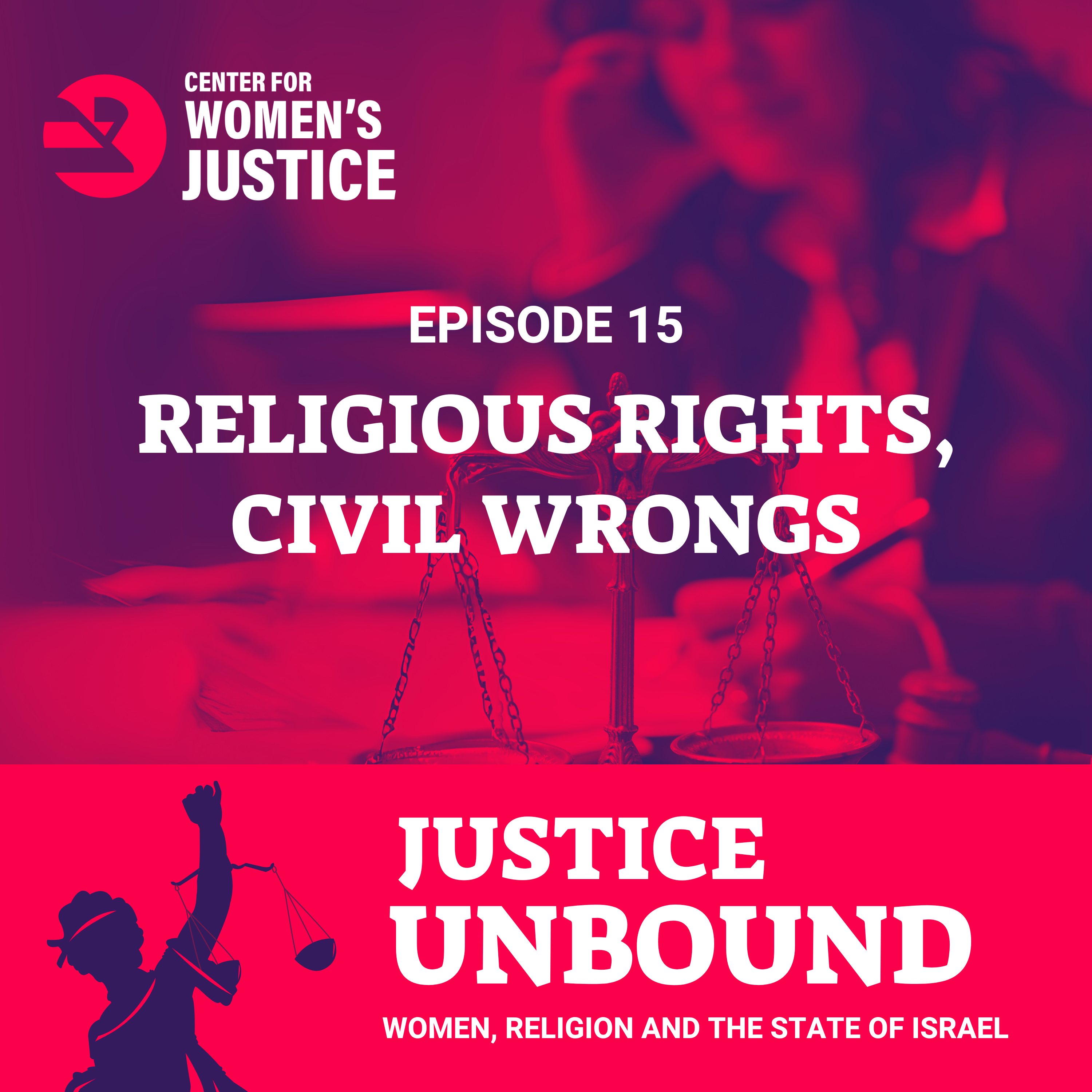 Justice Unbound: Women, Religion and the State of Israel(15) Religious Rights, Civil WrongsCan civil courts succeed where religious courts have failed? Rivkah Lubitch interviews Susan Weiss, founder of the Center for Women’s Justice, about a bold legal strategy she pioneered in Israel: suing recalcitrant husbands for damages in civil court when they refuse to grant their wives a get. With personal stories, legal insight, and hard-won victories, Susan reveals how her feminist legal strategy has shifted the power dynamic between women, men, and religious authority in Israel—and why the solution to get refusal may never come from within the system. Justice Unbound is made possible by the generous suppo...2025-07-0223 min
Justice Unbound: Women, Religion and the State of Israel(15) Religious Rights, Civil WrongsCan civil courts succeed where religious courts have failed? Rivkah Lubitch interviews Susan Weiss, founder of the Center for Women’s Justice, about a bold legal strategy she pioneered in Israel: suing recalcitrant husbands for damages in civil court when they refuse to grant their wives a get. With personal stories, legal insight, and hard-won victories, Susan reveals how her feminist legal strategy has shifted the power dynamic between women, men, and religious authority in Israel—and why the solution to get refusal may never come from within the system. Justice Unbound is made possible by the generous suppo...2025-07-0223 min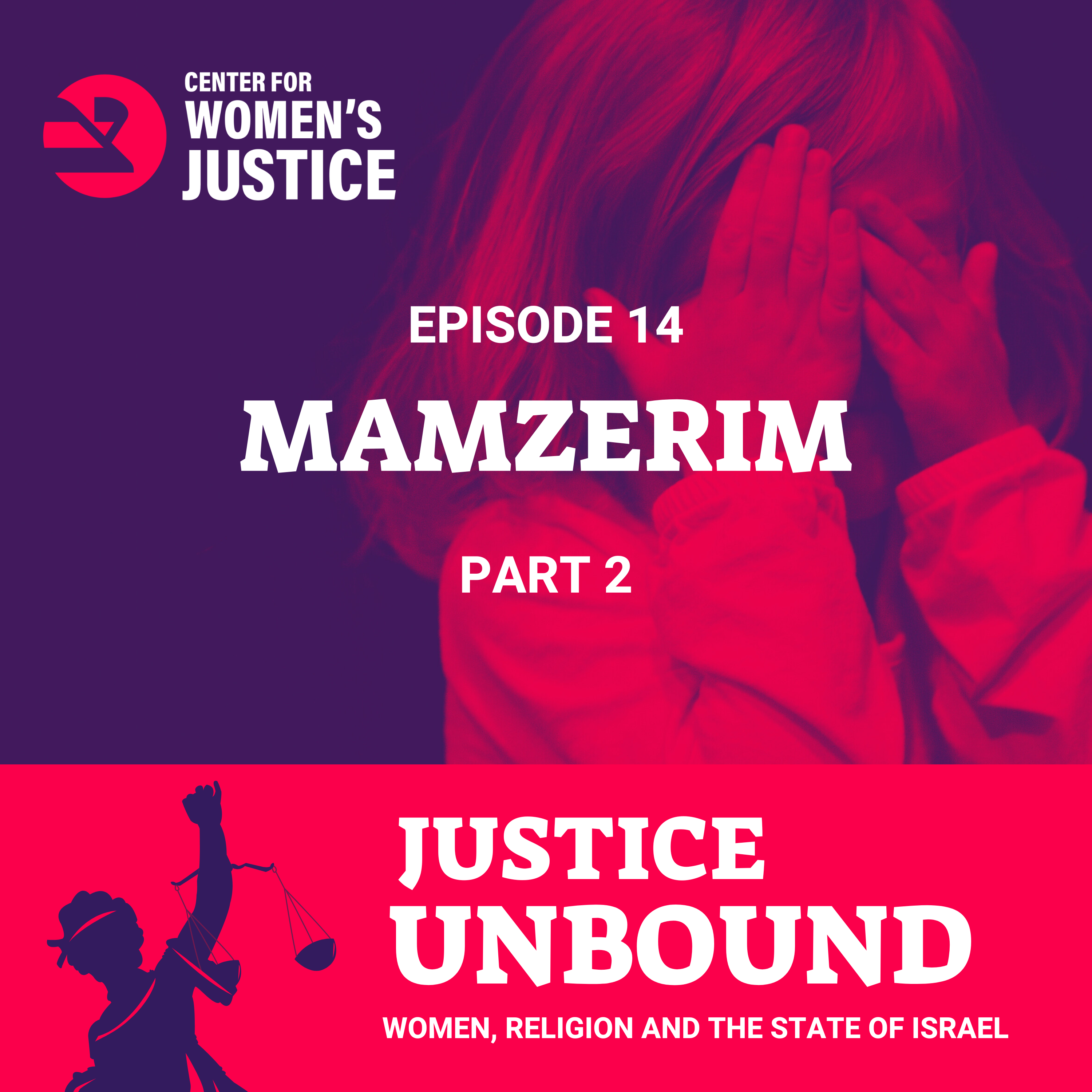 Justice Unbound: Women, Religion and the State of Israel(14) Mamzerim, Part 2In this follow-up episode, Rivkah unpacks the legal system that enforces mamzerut in Israel—how laws and state policies conspire to erase biological fathers, deny children their rights, and deepen the pain of already vulnerable families. Through real stories, she exposes the hidden costs of preserving religious fictions at the expense of justice. Justice Unbound is made possible by the generous support of the Gimprich Family Foundation. Mentioned in this episode: Ruth Halperin-Kaddari, “‘That which is crooked cannot be made straight’: Mamzerim in the Israeli Legal System” in Mamzerim: Labeled and Erased, edited by Emily D. Bilski and Nurit Jacobs-Yinon2025-05-2620 min
Justice Unbound: Women, Religion and the State of Israel(14) Mamzerim, Part 2In this follow-up episode, Rivkah unpacks the legal system that enforces mamzerut in Israel—how laws and state policies conspire to erase biological fathers, deny children their rights, and deepen the pain of already vulnerable families. Through real stories, she exposes the hidden costs of preserving religious fictions at the expense of justice. Justice Unbound is made possible by the generous support of the Gimprich Family Foundation. Mentioned in this episode: Ruth Halperin-Kaddari, “‘That which is crooked cannot be made straight’: Mamzerim in the Israeli Legal System” in Mamzerim: Labeled and Erased, edited by Emily D. Bilski and Nurit Jacobs-Yinon2025-05-2620 min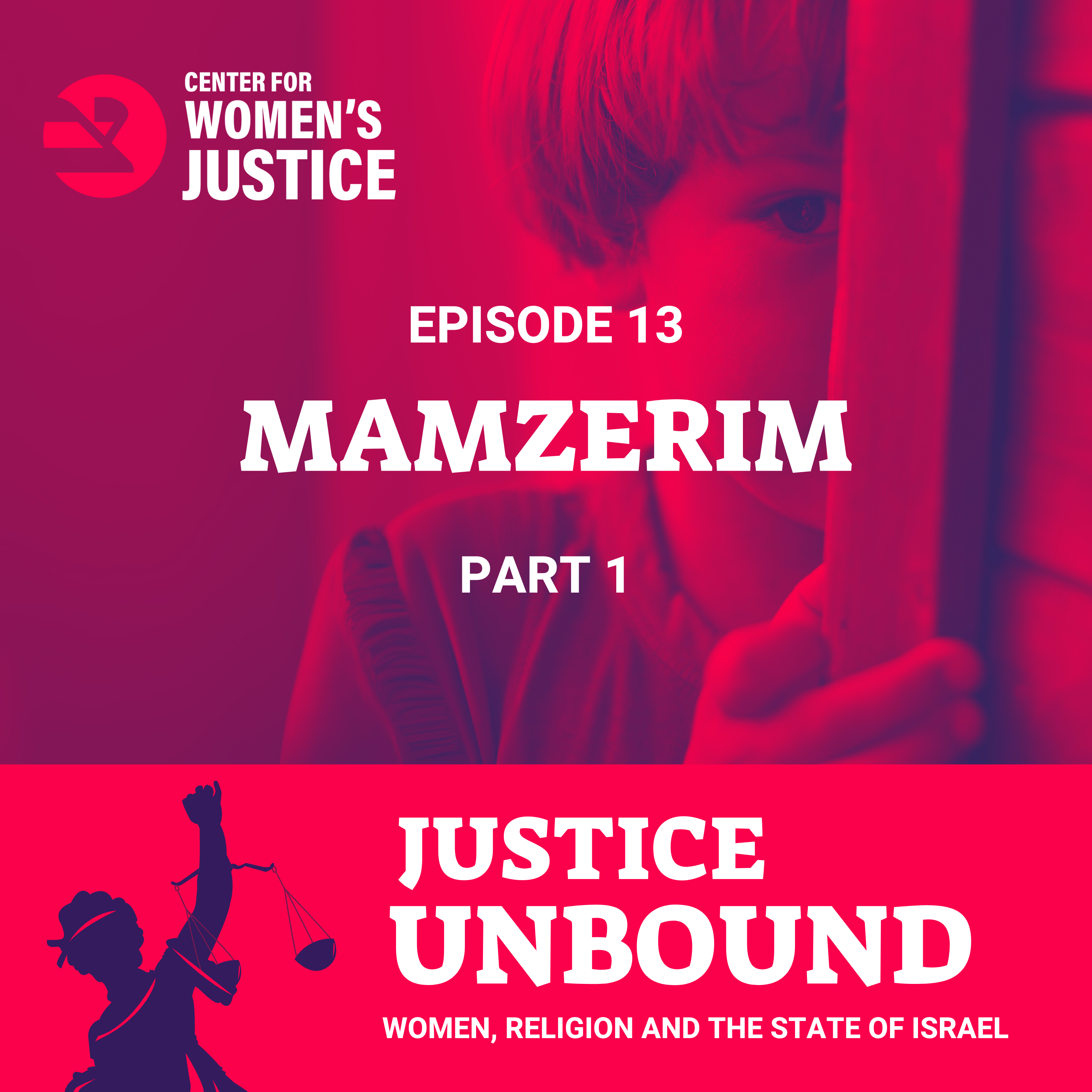 Justice Unbound: Women, Religion and the State of Israel(13) Mamzerim, Part 1Through a powerful story, Rivkah unpacks the painful and often hidden issue of mamzerut—a halachic status branding children as illegitimate and barring them from marrying within the Jewish community. Rivkah outlines the religious and social roots of this stigmatizing label, its devastating impact on families, and its dangerous entanglement with Israel’s divorce system. This is the first of a two-part series on one of Judaism’s most painful and morally fraught challenges. Justice Unbound is made possible by the generous support of the Gimprich Family Foundation. Mentioned in this episode: Mamzerim, Labeled and Erased, edited by Emily D. Bilski and...2025-05-1121 min
Justice Unbound: Women, Religion and the State of Israel(13) Mamzerim, Part 1Through a powerful story, Rivkah unpacks the painful and often hidden issue of mamzerut—a halachic status branding children as illegitimate and barring them from marrying within the Jewish community. Rivkah outlines the religious and social roots of this stigmatizing label, its devastating impact on families, and its dangerous entanglement with Israel’s divorce system. This is the first of a two-part series on one of Judaism’s most painful and morally fraught challenges. Justice Unbound is made possible by the generous support of the Gimprich Family Foundation. Mentioned in this episode: Mamzerim, Labeled and Erased, edited by Emily D. Bilski and...2025-05-1121 min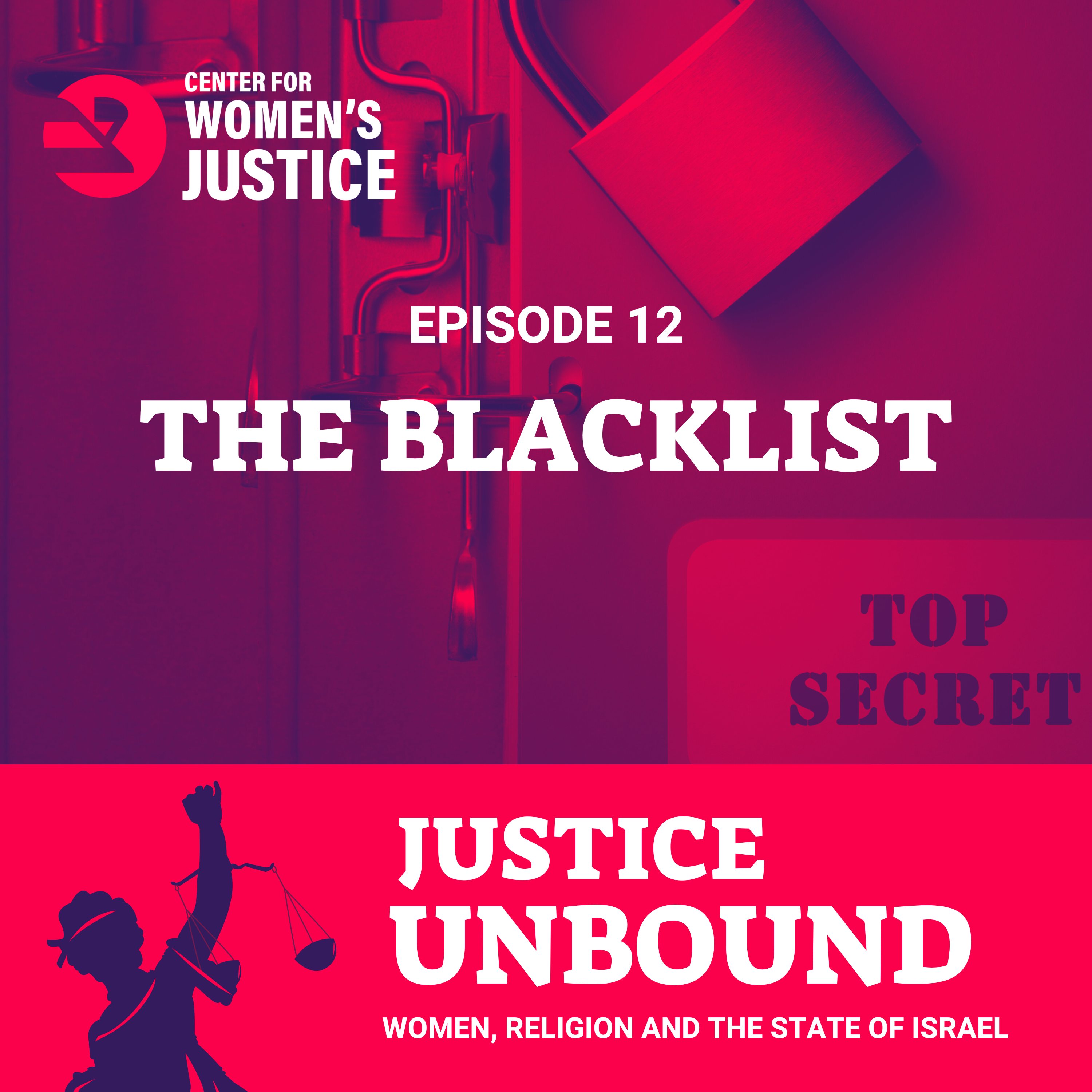 Justice Unbound: Women, Religion and the State of Israel(12) The BlacklistRivkah takes us deep into the shadows of Israel’s marriage system to explore the “blacklist”—a secret registry maintained by the Chief Rabbinate that tracks thousands of people prohibited from legally marrying in Israel. From accusations of adultery to the status of mamzerim, we explore who gets listed, how, and why it’s nearly impossible to clear one’s name. Behind closed doors, a quiet bureaucracy decides who may love—and who loses a fundamental right. Justice Unbound is made possible by the generous support of the Gimprich Family Foundation. 2025-04-2714 min
Justice Unbound: Women, Religion and the State of Israel(12) The BlacklistRivkah takes us deep into the shadows of Israel’s marriage system to explore the “blacklist”—a secret registry maintained by the Chief Rabbinate that tracks thousands of people prohibited from legally marrying in Israel. From accusations of adultery to the status of mamzerim, we explore who gets listed, how, and why it’s nearly impossible to clear one’s name. Behind closed doors, a quiet bureaucracy decides who may love—and who loses a fundamental right. Justice Unbound is made possible by the generous support of the Gimprich Family Foundation. 2025-04-2714 min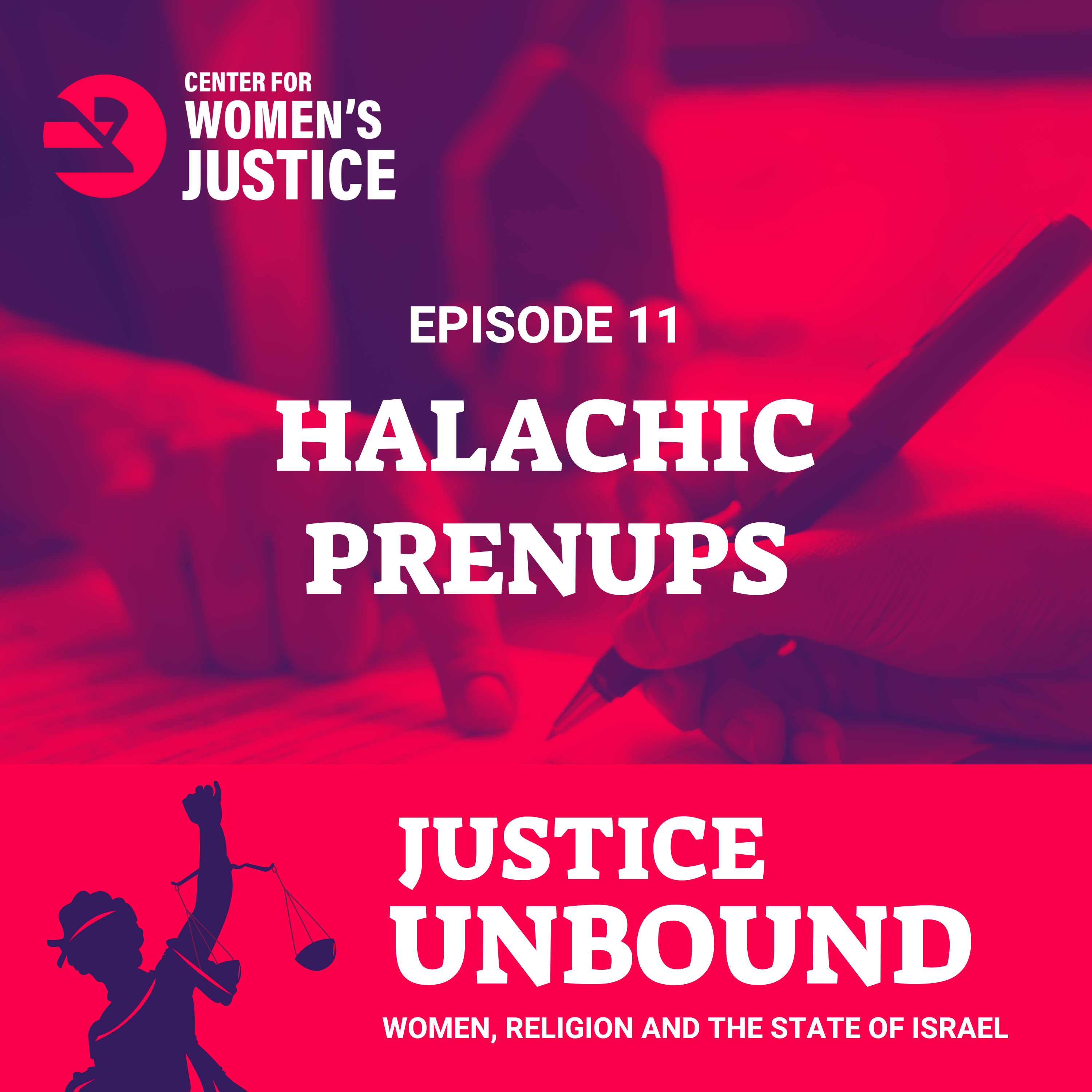 Justice Unbound: Women, Religion and the State of Israel(11) Halachic PrenupsToo many women find themselves powerless in the face of get refusal or being trapped as an agunah. But halachic prenuptial agreements can change that. Rivkah explains how these agreements use legal and halachic tools to prevent injustice and why every couple--engaged and married--should consider signing one. Find the agreements here. Justice Unbound is made possible by the generous support of the Gimprich Family Foundation.2025-03-2623 min
Justice Unbound: Women, Religion and the State of Israel(11) Halachic PrenupsToo many women find themselves powerless in the face of get refusal or being trapped as an agunah. But halachic prenuptial agreements can change that. Rivkah explains how these agreements use legal and halachic tools to prevent injustice and why every couple--engaged and married--should consider signing one. Find the agreements here. Justice Unbound is made possible by the generous support of the Gimprich Family Foundation.2025-03-2623 min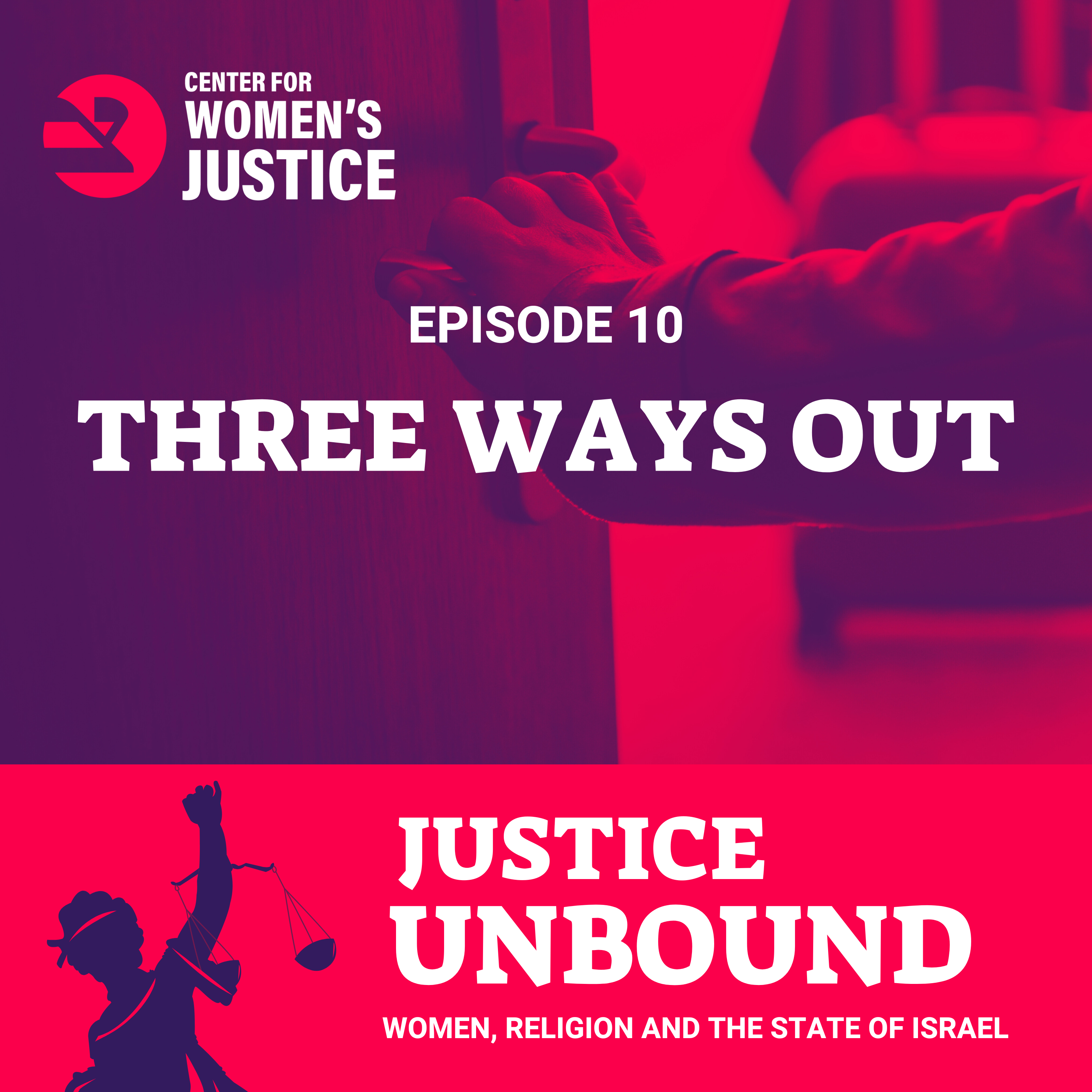 Justice Unbound: Women, Religion and the State of Israel(10) Three Ways OutSusan reveals how Israel’s rabbinic courts concoct an unholy trifecta of rigid formalism, extortion, and violence to deal with women trapped in unwanted marriages. Who really holds the power—the husbands or the dayanim (rabbinic judges)? Should the ends justify the means when punishing get refusers? Susan and Rivkah discuss why change remains elusive when justice, religion, and human rights collide. Justice Unbound is made possible by the generous support of the Gimprich Family Foundation. Mentioned in this episode: Article: "A Woman Acquires [Freedom for] Herself in 3 Ways…" by Susan Weiss Book: Marriage and Divorce in the Jewish State: Israel's Civil War...2025-03-0934 min
Justice Unbound: Women, Religion and the State of Israel(10) Three Ways OutSusan reveals how Israel’s rabbinic courts concoct an unholy trifecta of rigid formalism, extortion, and violence to deal with women trapped in unwanted marriages. Who really holds the power—the husbands or the dayanim (rabbinic judges)? Should the ends justify the means when punishing get refusers? Susan and Rivkah discuss why change remains elusive when justice, religion, and human rights collide. Justice Unbound is made possible by the generous support of the Gimprich Family Foundation. Mentioned in this episode: Article: "A Woman Acquires [Freedom for] Herself in 3 Ways…" by Susan Weiss Book: Marriage and Divorce in the Jewish State: Israel's Civil War...2025-03-0934 min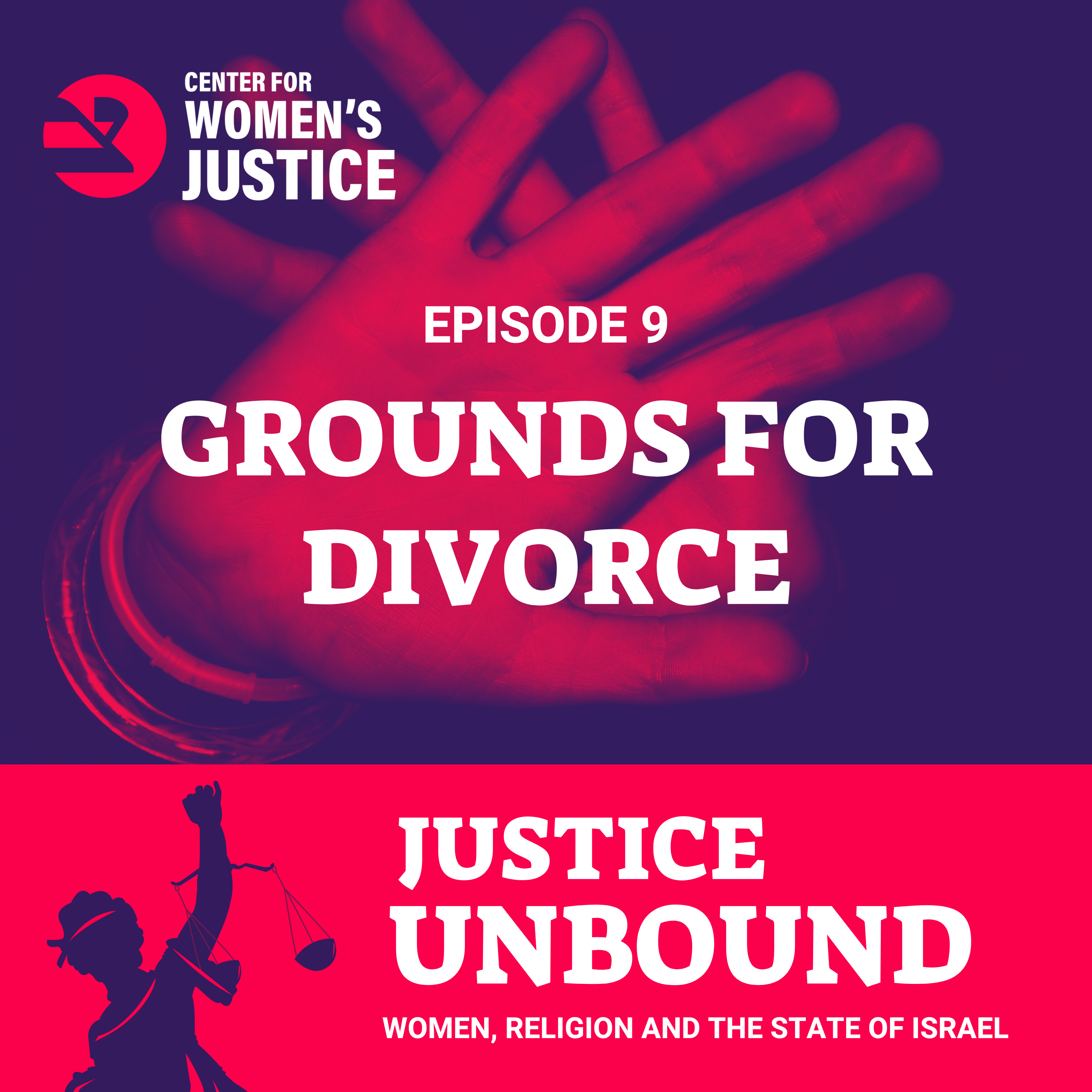 Justice Unbound: Women, Religion and the State of Israel(9) Grounds for DivorceWhat must a woman prove to be divorced in a rabbinic court? Susan shares a shocking case where she learned firsthand that, no matter what a husband does—whether he rapes, beats, cheats, takes another wife, withholds intimacy, or even if his wife is utterly repulsed by him—none of it grants her the right to leave. No fault of his is considered grounds for divorce. How is this possible? What does this mean for women trapped in these marriages? Justice Unbound is made possible by the generous support of the Gimprich Family Foundation.2025-02-2319 min
Justice Unbound: Women, Religion and the State of Israel(9) Grounds for DivorceWhat must a woman prove to be divorced in a rabbinic court? Susan shares a shocking case where she learned firsthand that, no matter what a husband does—whether he rapes, beats, cheats, takes another wife, withholds intimacy, or even if his wife is utterly repulsed by him—none of it grants her the right to leave. No fault of his is considered grounds for divorce. How is this possible? What does this mean for women trapped in these marriages? Justice Unbound is made possible by the generous support of the Gimprich Family Foundation.2025-02-2319 min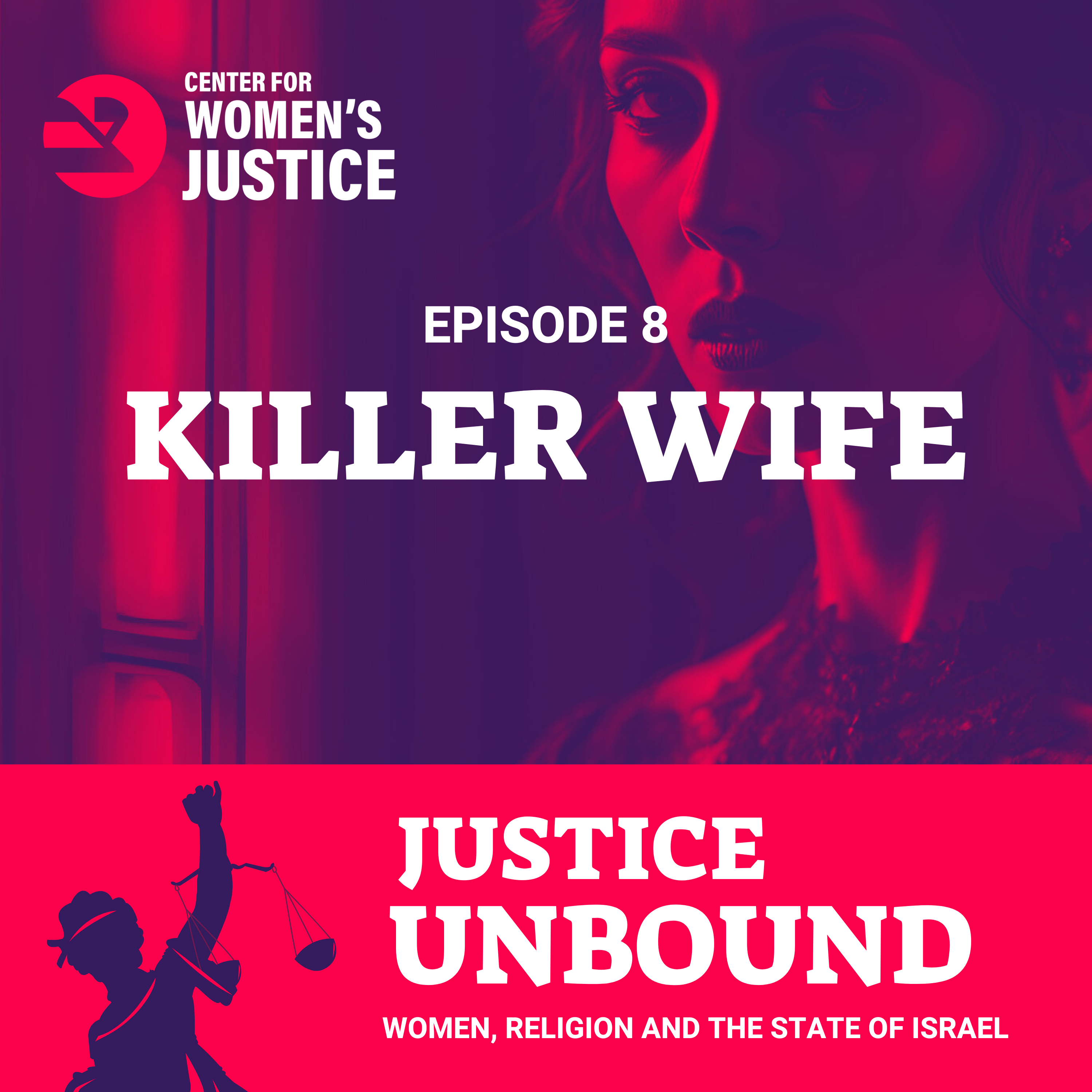 Justice Unbound: Women, Religion and the State of Israel(8) Killer WifeAccording to Jewish tradition, a woman who outlives two husbands is labeled a “killer wife,” believed to bring misfortune to any future spouse. In Israel, a woman suspected of being a killer wife needs special permission to legally remarry. Susan and Rivkah dive into a fascinating 2014 rabbinic court ruling that allows one such woman to escape the stigma—while paradoxically reinforcing the very law that condemned her. Justice Unbound is made possible by the generous support of the Gimprich Family Foundation. Book mentioned in this podcast: Pious and Rebellious: Jewish Women in Medieval Europe by Avraham Grossman2025-02-0916 min
Justice Unbound: Women, Religion and the State of Israel(8) Killer WifeAccording to Jewish tradition, a woman who outlives two husbands is labeled a “killer wife,” believed to bring misfortune to any future spouse. In Israel, a woman suspected of being a killer wife needs special permission to legally remarry. Susan and Rivkah dive into a fascinating 2014 rabbinic court ruling that allows one such woman to escape the stigma—while paradoxically reinforcing the very law that condemned her. Justice Unbound is made possible by the generous support of the Gimprich Family Foundation. Book mentioned in this podcast: Pious and Rebellious: Jewish Women in Medieval Europe by Avraham Grossman2025-02-0916 min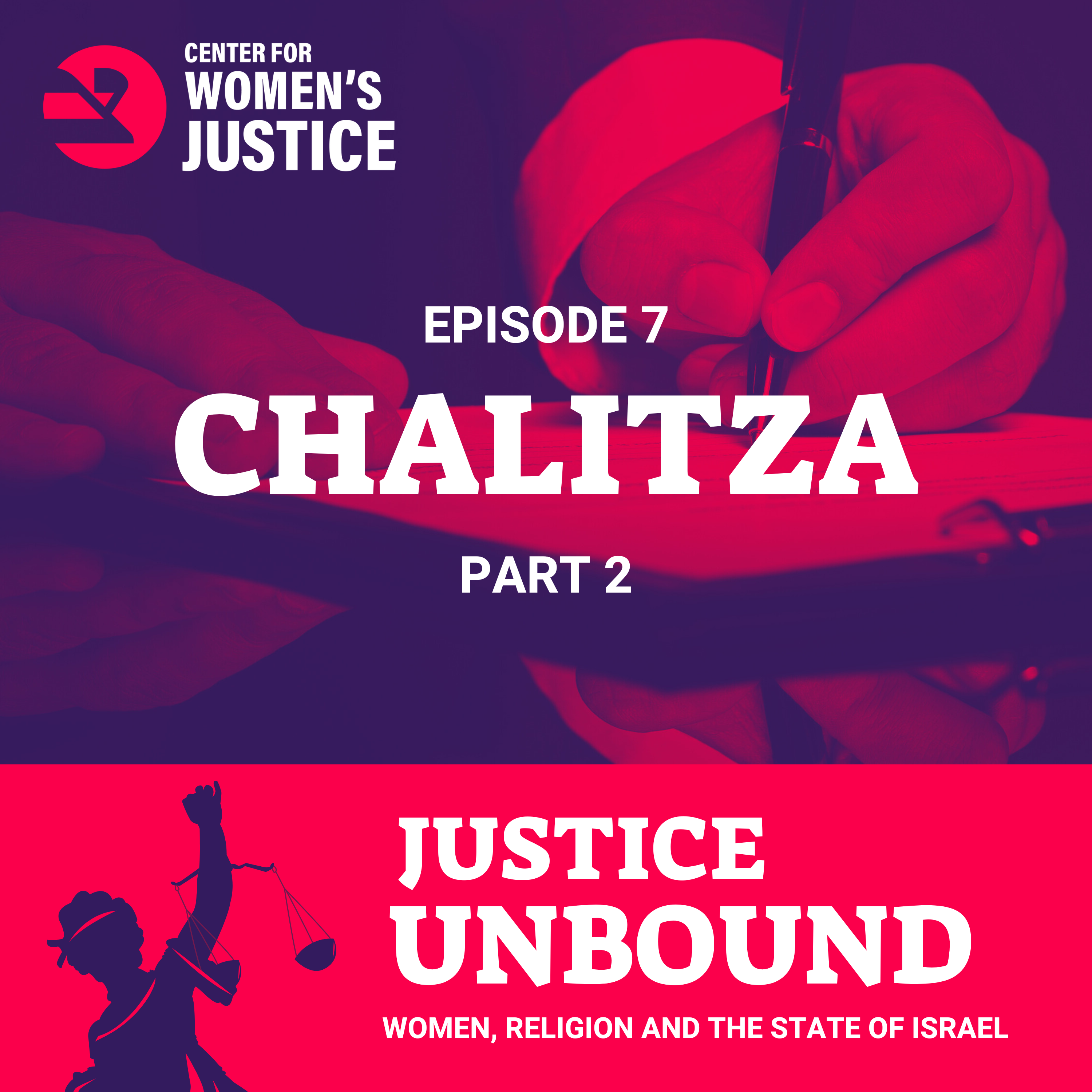 Justice Unbound: Women, Religion and the State of Israel(7) Chalitza, Part 2As the war in Israel leaves countless families shattered, the issue of chalitza resurfaces with complicated consequences for widows. In this second episode on chalitza, Susan and Rivkah discuss halachic solutions--past and present--and why the current crisis makes it more urgent than ever to address. Learn about what the Center for Women's Justice is doing to ensure women’s freedom and dignity in their most vulnerable moments. Justice Unbound is made possible by the generous support of the Gimprich Family Foundation. Check out CWJ’s halachic document that addresses chalitza, as well as CWJ’s full halachic prenuptial agreement, here: https://www.sh...2025-01-2722 min
Justice Unbound: Women, Religion and the State of Israel(7) Chalitza, Part 2As the war in Israel leaves countless families shattered, the issue of chalitza resurfaces with complicated consequences for widows. In this second episode on chalitza, Susan and Rivkah discuss halachic solutions--past and present--and why the current crisis makes it more urgent than ever to address. Learn about what the Center for Women's Justice is doing to ensure women’s freedom and dignity in their most vulnerable moments. Justice Unbound is made possible by the generous support of the Gimprich Family Foundation. Check out CWJ’s halachic document that addresses chalitza, as well as CWJ’s full halachic prenuptial agreement, here: https://www.sh...2025-01-2722 min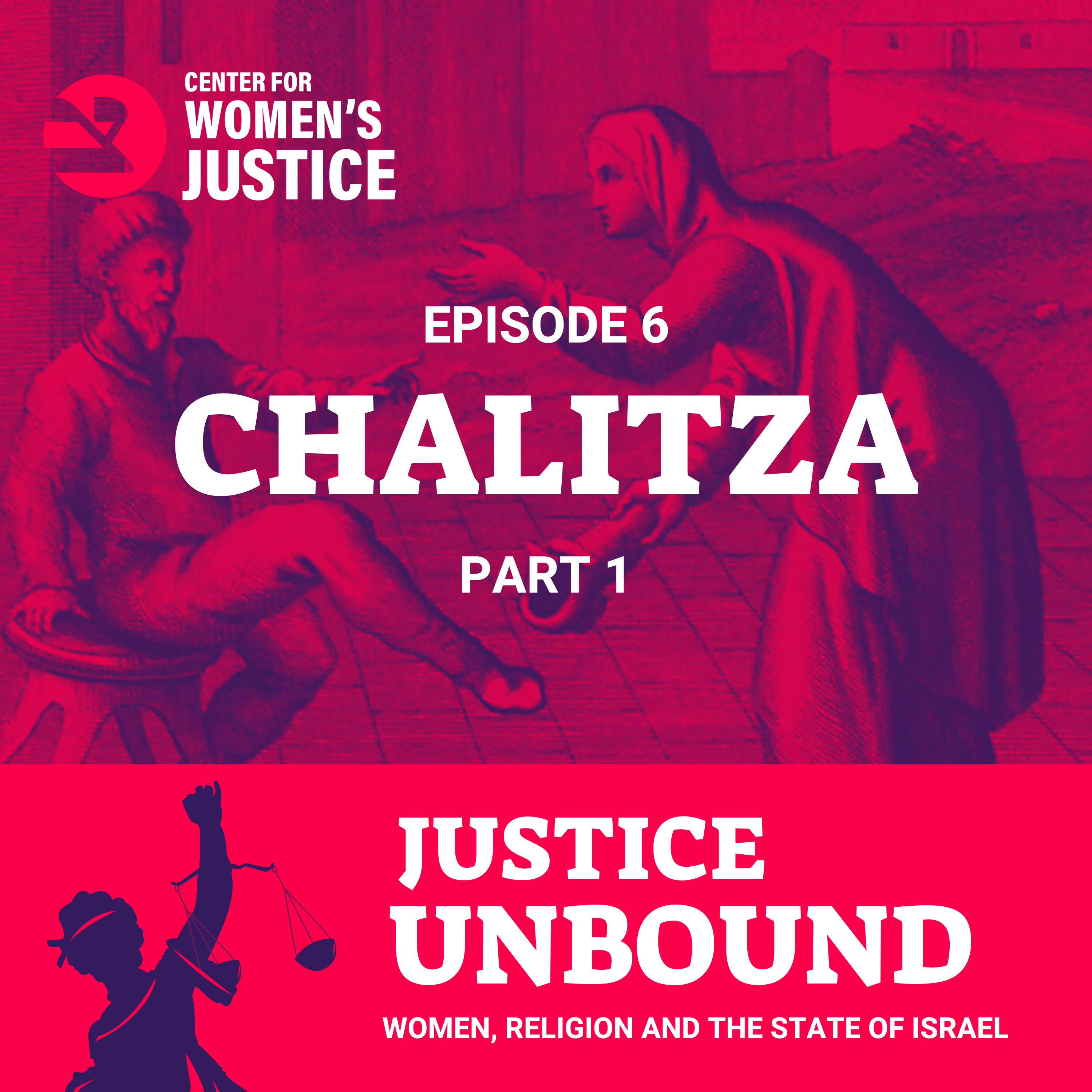 Justice Unbound: Women, Religion and the State of Israel(6) Chalitza, Part 1Susan and Rivkah delve into the ancient ritual of chalitza, a halachic ceremony releasing a widow from marrying her late husband’s brother. What does chalitza mean for women today, especially in the modern state of Israel? What happens to a woman when chalitza can’t—or won’t—be done? Through personal stories, expert insights and a critical lens, we explore the halachic, legal, and cultural dimensions of this practice. Justice Unbound is made possible by the generous support of the Gimprich Family Foundation. Mentioned in this episode: Family Law and the Challenge of Modernity: Debate about Levirate Ma...2025-01-1926 min
Justice Unbound: Women, Religion and the State of Israel(6) Chalitza, Part 1Susan and Rivkah delve into the ancient ritual of chalitza, a halachic ceremony releasing a widow from marrying her late husband’s brother. What does chalitza mean for women today, especially in the modern state of Israel? What happens to a woman when chalitza can’t—or won’t—be done? Through personal stories, expert insights and a critical lens, we explore the halachic, legal, and cultural dimensions of this practice. Justice Unbound is made possible by the generous support of the Gimprich Family Foundation. Mentioned in this episode: Family Law and the Challenge of Modernity: Debate about Levirate Ma...2025-01-1926 min Justice Unbound: Women, Religion and the State of Israel(5) Millet SystemWhat does the Ottoman Sultan have to do with Jewish divorce in 2025? Susan and Rivkah delve into the surprising origins of Israel’s two-tracked civil system, consisting of religious and secular courts. What is the difference between these secular and religious courts, and how do Israelis decide where to go? Are non-Jews in Israel also bound by religious courts? And how can a democratic state operate religious courts, anyway? Justice Unbound is made possible by the generous support of the Gimprich Family Foundation. Mentioned in this episode: Scholarship of Dr. Yüksel Sezgin https://bit.ly/YSezgin2025-01-0516 min
Justice Unbound: Women, Religion and the State of Israel(5) Millet SystemWhat does the Ottoman Sultan have to do with Jewish divorce in 2025? Susan and Rivkah delve into the surprising origins of Israel’s two-tracked civil system, consisting of religious and secular courts. What is the difference between these secular and religious courts, and how do Israelis decide where to go? Are non-Jews in Israel also bound by religious courts? And how can a democratic state operate religious courts, anyway? Justice Unbound is made possible by the generous support of the Gimprich Family Foundation. Mentioned in this episode: Scholarship of Dr. Yüksel Sezgin https://bit.ly/YSezgin2025-01-0516 min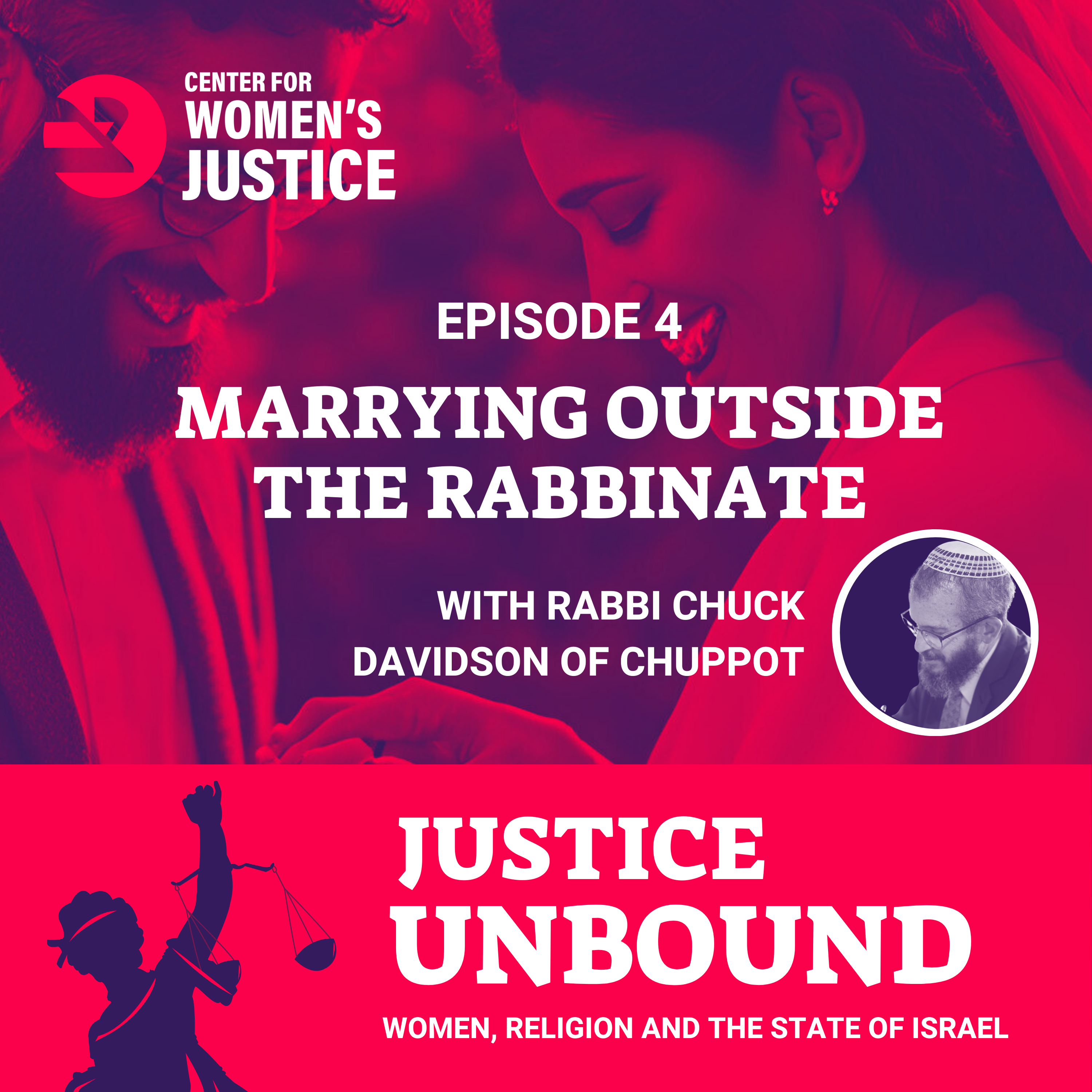 Justice Unbound: Women, Religion and the State of Israel(4) Marrying Outside the Rabbinate, with Rabbi Chuck Davidson of ChuppotChuppot is an independent rabbinic-halachic organization that marries couples in accordance with Jewish law--but outside the purview of the State Rabbinate. Since its establishment in 2018, Chuppot has married 1600 couples... and counting. Why does an alternative like this exist? And what ramifications does it have for the next generation? Rivkah speaks with Rabbi Chuck Davidson, director of Chuppot’s halachic department. Justice Unbound is made possible by the generous support of the Gimprich Family Foundation.2024-12-2221 min
Justice Unbound: Women, Religion and the State of Israel(4) Marrying Outside the Rabbinate, with Rabbi Chuck Davidson of ChuppotChuppot is an independent rabbinic-halachic organization that marries couples in accordance with Jewish law--but outside the purview of the State Rabbinate. Since its establishment in 2018, Chuppot has married 1600 couples... and counting. Why does an alternative like this exist? And what ramifications does it have for the next generation? Rivkah speaks with Rabbi Chuck Davidson, director of Chuppot’s halachic department. Justice Unbound is made possible by the generous support of the Gimprich Family Foundation.2024-12-2221 min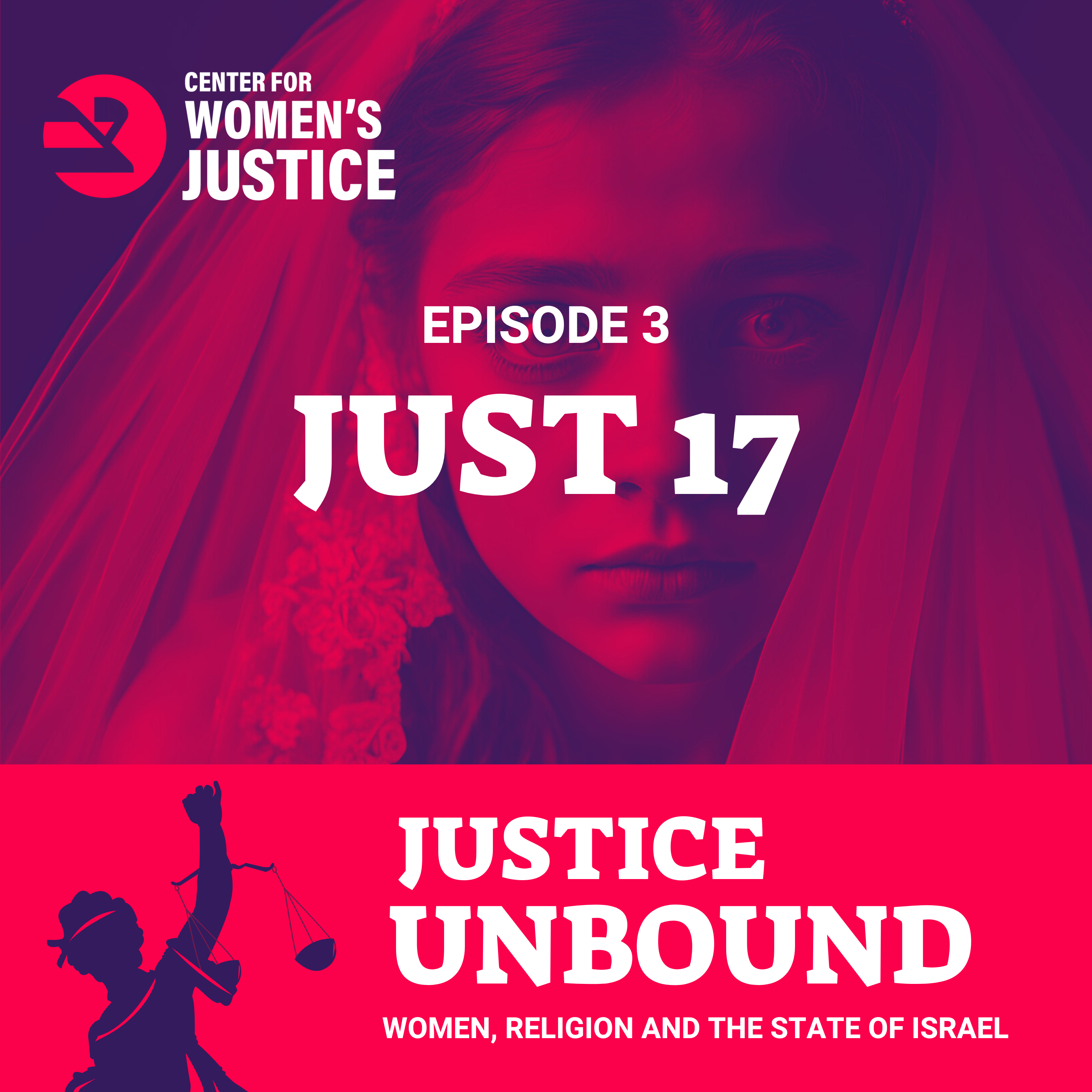 Justice Unbound: Women, Religion and the State of Israel(3) Just 17Can a Jewish marriage that was never consummated be annulled? Not so fast. Susan Weiss and Rivkah Lubitch tell the story of a 17-year-old girl in a marriage she can’t escape. The episode introduces the halachic concept of “ma’is alay”–“he disgusts me”–circumstances under which a woman cannot stand to sleep with her husband, which has implications for divorce. Being repulsed by her husband did not help the 17-year-old girl get out of her marriage. What did? Justice Unbound is made possible by the generous support of the Gimprich Family Foundation.2024-12-0415 min
Justice Unbound: Women, Religion and the State of Israel(3) Just 17Can a Jewish marriage that was never consummated be annulled? Not so fast. Susan Weiss and Rivkah Lubitch tell the story of a 17-year-old girl in a marriage she can’t escape. The episode introduces the halachic concept of “ma’is alay”–“he disgusts me”–circumstances under which a woman cannot stand to sleep with her husband, which has implications for divorce. Being repulsed by her husband did not help the 17-year-old girl get out of her marriage. What did? Justice Unbound is made possible by the generous support of the Gimprich Family Foundation.2024-12-0415 min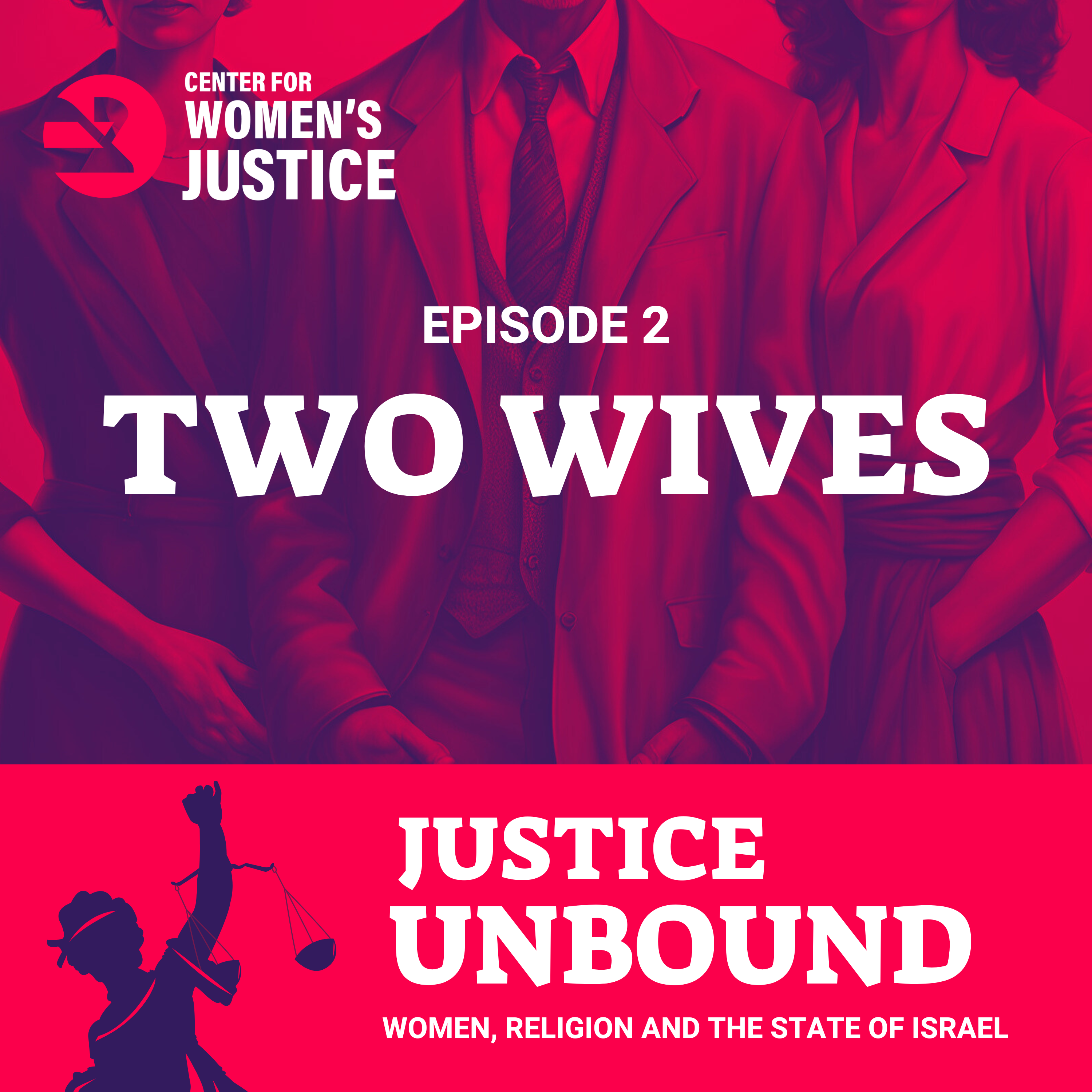 Justice Unbound: Women, Religion and the State of Israel(2) Two WivesIs polygamy legal in Israel, and is it grounds for divorce? Susan Weiss and Rivkah Lubitch share the story of Rivkah’s client, whose husband married a second wife while refusing to divorce the first. This episode underscores how women pay the price when religious law is imposed by the state. Justice Unbound is made possible by the generous support of the Gimprich Family Foundation.2024-11-2614 min
Justice Unbound: Women, Religion and the State of Israel(2) Two WivesIs polygamy legal in Israel, and is it grounds for divorce? Susan Weiss and Rivkah Lubitch share the story of Rivkah’s client, whose husband married a second wife while refusing to divorce the first. This episode underscores how women pay the price when religious law is imposed by the state. Justice Unbound is made possible by the generous support of the Gimprich Family Foundation.2024-11-2614 min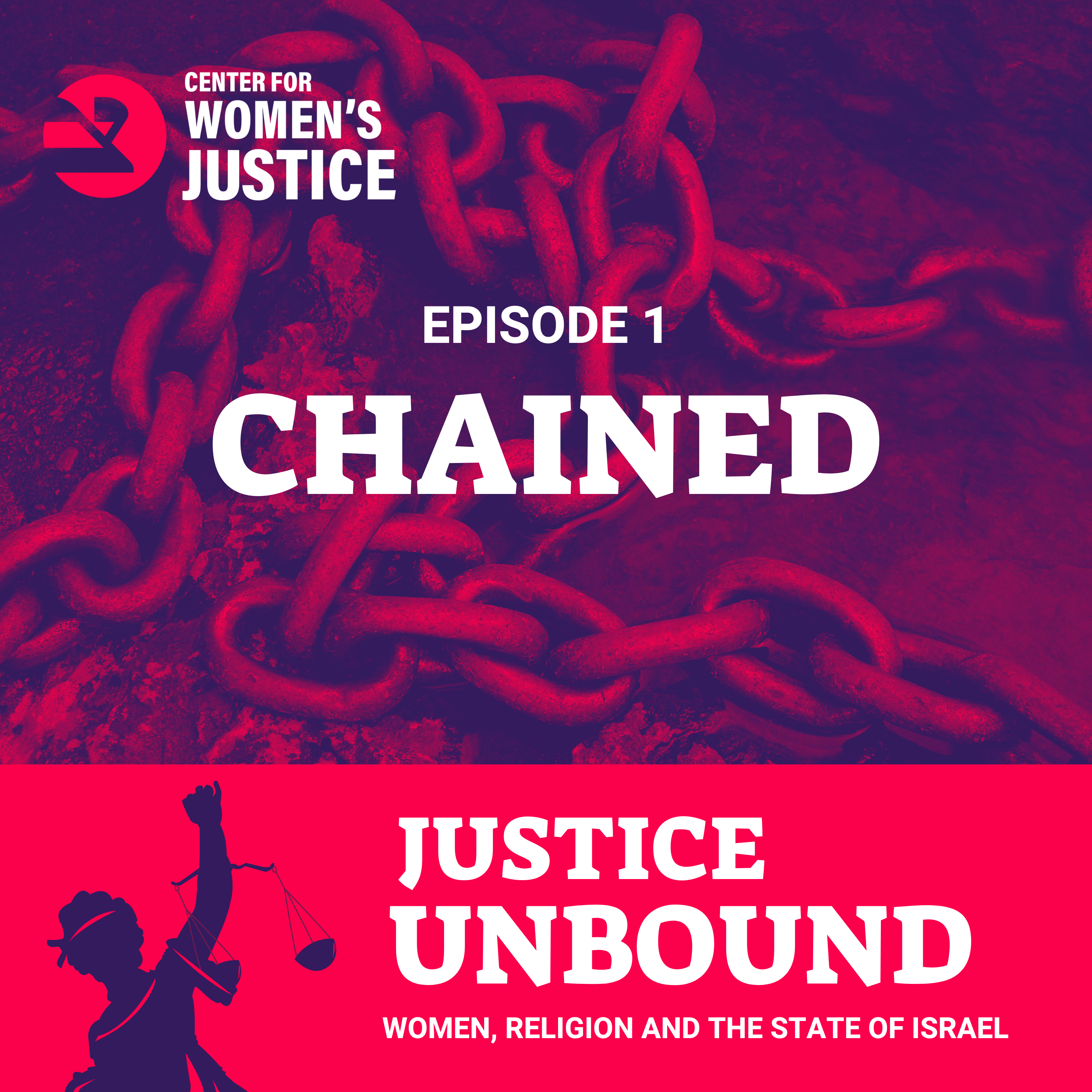 Justice Unbound: Women, Religion and the State of Israel(1) ChainedSusan Weiss and Rivkah Lubitch talk about agunot, Jewish women held in marital captivity. They explain marriage and divorce in Jewish Law, the legal system in Israel, and how things work in the state-backed rabbinic courts. This episode tells the story of one of Rivkah’s first clients, who waited 20 years for her get—Jewish bill of divorce. Justice Unbound is made possible by the generous support of the Gimprich Family Foundation.2024-11-1312 min
Justice Unbound: Women, Religion and the State of Israel(1) ChainedSusan Weiss and Rivkah Lubitch talk about agunot, Jewish women held in marital captivity. They explain marriage and divorce in Jewish Law, the legal system in Israel, and how things work in the state-backed rabbinic courts. This episode tells the story of one of Rivkah’s first clients, who waited 20 years for her get—Jewish bill of divorce. Justice Unbound is made possible by the generous support of the Gimprich Family Foundation.2024-11-1312 min Voices of Women at Wartime(15) The Gaza War, Women, and Jewish LawDr. Susan Weiss, founder and director of the Center for Women’s Justice, interviews podcast host and to'enet rabbanit Rivkah Lubitch about how Jewish law might affect women in the aftermath of the Gaza war. Susan and Rivkah talk about women who might not be able to get divorced (agunot); women who might need their brother-in-law’s permission to remarry (halitzah); and women who may — or may not — have been raped, and how that affects their relationships. Who might be affected adversely by Jewish law? Who might be absolved? How, if at all, will the rabbis resolve the issues raised...2024-02-2126 min
Voices of Women at Wartime(15) The Gaza War, Women, and Jewish LawDr. Susan Weiss, founder and director of the Center for Women’s Justice, interviews podcast host and to'enet rabbanit Rivkah Lubitch about how Jewish law might affect women in the aftermath of the Gaza war. Susan and Rivkah talk about women who might not be able to get divorced (agunot); women who might need their brother-in-law’s permission to remarry (halitzah); and women who may — or may not — have been raped, and how that affects their relationships. Who might be affected adversely by Jewish law? Who might be absolved? How, if at all, will the rabbis resolve the issues raised...2024-02-2126 min